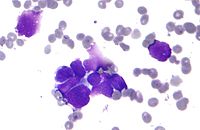
Photo from wikipedia
Programmed cell death 1 (PD-1) plays an important role in subsiding immune responses, in promoting self-tolerance through suppressing the activity of T-cells, and in promoting differentiation of regulatory T-cells. One… Click to show full abstract
Programmed cell death 1 (PD-1) plays an important role in subsiding immune responses, in promoting self-tolerance through suppressing the activity of T-cells, and in promoting differentiation of regulatory T-cells. One of its ligands, programmed cell death ligand 1 (PD-L1) acts as a checkpoint regulator in immune cells and is also expressed in a wide range of cancer types. Anti-PD therapy modulates immune responses at the tumor site, targets tumor-induced immune defects, and repairs ongoing immune responses. Since drugs that target the PD-1/PD-L1 pathways became available as a cancer treatment, there is need for the use of different antibodies to detect the presence of these proteins in tumoral samples by immunohistochemistry or other assays. Because the detection of these antigens in tumor samples is highly clinically informative for guiding treatment decisions, especially to establish the aptness of a patient to receive anti-PD therapy, it is necessary to have a validation process that guaranties that the test results obtained when using antibodies against these proteins are specific, selective, reproducible, and conducive to quantification of antigen abundance in cancer tissue sections. Here we describe an automated immunohistochemistry staining procedure that can be applied for the validation of multiple anti-PD-L1 antibody clones when used for the staining of formalin-fixed, paraffin-embedded lung cancer tissue sections.
Journal Title: Methods in molecular biology
Year Published: 2021
Link to full text (if available)
Share on Social Media: Sign Up to like & get
recommendations!